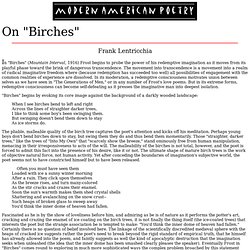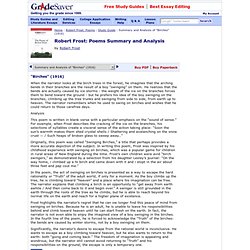

Homework , oh homework, I wish I had more. William Carlos Williams. William Carlos Williams has always been known as an experimenter, an innovator, a revolutionary figure in American poetry.

Yet in comparison to artists of his own time who sought a new environment for creativity as expatriates in Europe, Williams lived a remarkably conventional life. A doctor for more than forty years serving the New Jersey town of Rutherford, he relied on his patients, the America around him, and his own ebullient imagination to create a distinctively American verse. Often domestic in focus and "remarkable for its empathy, sympathy, its muscular and emotional identification with its subjects," Williams's poetry is also characteristically honest: "There is no optimistic blindness in Williams," wrote Randall Jarrell, "though there is a fresh gaiety, a stubborn or invincible joyousness. " Aside from an emerging writing consciousness, Williams's early life was "sweet and sour," reported Reed Whittemore; Williams himself wrote that "terror dominated my youth, not fear.
" Frost’s Early Poems: “Birches” Complete Text When I see birches bend to left and right Across the lines of straighter darker trees, I like to think some boy’s been swinging them.

But swinging doesn’t bend them down to stay As ice storms do. Often you must have seen them 5 Loaded with ice a sunny winter morning After a rain. They click upon themselves As the breeze rises, and turn many-colored As the stir cracks and crazes their enamel. Soon the sun’s warmth makes them shed crystal shells 10 Shattering and avalanching on the snow crust— Such heaps of broken glass to sweep away You’d think the inner dome of heaven had fallen. Summary When the speaker sees bent birch trees, he likes to think that they are bent because boys have been “swinging” them.
Form This is blank verse, with numerous variations on the prevailing iambic foot. Commentary The title is “Birches,” but the subject is birch “swinging.” On "Birches" On "Birches" Frank Lentricchia In "Birches" (Mountain Interval, 1916) Frost begins to probe the power of his redemptive imagination as it moves from its playful phase toward the brink of dangerous transcendence.

The movement into transcendence is a movement into a realm of radical imaginative freedom where (because redemption has succeeded too well) all possibilities of engagement with the common realities of experience are dissolved. In its moderation, a redemptive consciousness motivates union between selves as we have seen in "The Generations of Men," or in any number of Frost's love poems. But in its extreme forms, redemptive consciousness can become self-defeating as it presses the imaginative man into deepest isolation. "Birches" begins by evoking its core image against the background of a darkly wooded landscape: When I see birches bend to left and right Across the lines of straighter darker trees, I like to think some boy's been swinging them.
John C. The Poetry of Robert Frost Study Guide : Summary and Analysis of "Birches" (1916) When the narrator looks at the birch trees in the forest, he imagines that the arching bends in their branches are the result of a boy “swinging” on them.

He realizes that the bends are actually caused by ice storms - the weight of the ice on the branches forces them to bend toward the ground - but he prefers his idea of the boy swinging on the branches, climbing up the tree trunks and swinging from side to side, from earth up to heaven. The narrator remembers when he used to swing on birches and wishes that he could return to those carefree days. Analysis This poem is written in blank verse with a particular emphasis on the “sound of sense.” For example, when Frost describes the cracking of the ice on the branches, his selections of syllables create a visceral sense of the action taking place: “Soon the sun’s warmth makes them shed crystal shells / Shattering and avalanching on the snow crust — / Such heaps of broken glass to sweep away…”